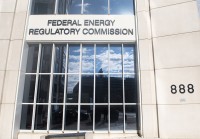Columbia Riverkeeper joined 54 other organizations in urging the Federal Energy Regulatory Commission to stop rubber stamping new pipeline projects and to consider the significant impacts these projects pose to our climate and disadvantaged communities.
Fracked Gas Updates: News on the National Front

In February, the Federal Energy Regulatory Commission (Commission) renewed an effort it started back in 2018 seeking information from interested groups and individuals about whether, and if so how, the Commission should revise its decade old policy statement that governs how the Commission reviews the certification of new interstate fracked gas pipelines. Under the Natural Gas Act, the Commission is tasked with evaluating whether proposed interstate gas pipeline projects are in the public interest. Judicial precedent, and the Commission’s own 1999 Policy Statement, have interpreted this directive as giving the Commission very broad authority to review all relevant factors in determining whether the new infrastructure is, in fact, in the public interest.
Unfortunately, in practice the Commission relies almost entirely on whether the pipeline company has “precedent agreements” in place when deciding whether the project is in the public interest. Essentially, if a pipeline company has lined up buyers for the gas that will be transported via the new or expanded pipeline, the Commission decides that those sales agreements demonstrate that the new gas infrastructure is necessary and in the public interest. This review rarely considers who those downstream customers are—in many cases the “customers” are actually affiliates of the pipeline company.
Although Congress gave the Commission very broad discretion to consider whether a pipeline project is in the public interest, the current Policy Statement requires very little consideration of greenhouse gas emissions, climate impacts, or the impacts these pipeline projects have on disadvantaged communities. In an effort to resolve that significant oversight, this week Riverkeeper joined 54 other public interest organizations in submitting an extensive—110-page long—comment document that strongly urges the Commission to fully account for the risks gas pipelines pose to the climate and disadvantaged communities during its review of those projects. Riverkeeper also submitted a separate comment, urging the Commission to consider federal and state climate legislation when deciding whether a specific project is in the public interest. Oregon, for example, is currently considering legislation that would require a complete phase out of fossil fuel generated retail electricity by 2040. Approximately a dozen other states have passed, or are considering, similar legislation—sending a clear message that new fracked gas infrastructure in those states is most decidedly not in the public interest.
Riverkeeper will continue to track the Commission’s efforts to revise its review criteria and to do everything we can to change the Commission’s current practice of rubber stamping new pipeline projects without fully considering the significant impacts these projects pose to disadvantaged communities and our climate.
FOR IMMEDIATE RELEASE
Pipeline Reviews Need Overhaul to Reflect Climate Risks, Groups Say
WASHINGTON (May 26, 2021)–The Federal Energy Regulatory Commission must fully account for the risks gas pipelines pose to the climate and disadvantaged communities when reviewing those projects, a broad group of health and environmental groups said today.
In 110-page comments submitted to FERC, the groups spell out how and why the commission needs to end its practice of essentially rubberstamping gas industry applications to build new pipelines and liquefied natural gas export facilities.
Given court decisions against FERC, the impact of these projects on disadvantaged communities, and the urgency of taking action to limit temperature increases to 1.5 degrees Celsius, a fulsome assessment of environmental risks and options is needed.
“Given this stark science, any permitting decision should include a determination that the project is consistent with a broader program that will reduce national emissions to stay within the 1.5°C budget,” the groups say. “Put simply, a business-as-usual approach to fossil fuel infrastructure permitting will condemn humanity to a degraded future – an outcome wholly not in the public interest.”
The comments were led by NRDC (Natural Resources Defense Council), Conservation Law Foundation, Earthjustice, Food & Water Watch, Sierra Club, and the Western Environmental Law Center. A total of 55 groups signed on to the comments, which are available here.
New Approach Needed
FERC has greenlighted more than 1,000 pipeline and LNG projects since 1999 while rejecting only a handful. But the commission must change its approach given its new focus on environmental justice, recent legal decisions, and the new urgency about climate change.
Just this month, the Environmental Protection Agency published a report showing that heat waves are more intense, wildfires are starting earlier each year, and flooding more likely. And the International Energy Agency said nations need to halt new approvals for fossil fuel infrastructure.
The comments focus on specific questions laid out by FERC as it seeks to update its natural gas policy statement. They lay out the legal reasons under the Natural Gas Act and National Environmental Policy Act that the commission must update its reviews to better assess if a pipeline project is really in the public interest.
“A private company’s desire to make a profit cannot and must not be proxy for determining if there is a genuine public need for a proposed pipeline,” they say.
As states adopt clean energy policies and the cost of renewable energy falls, FERC needs to adapt to that changing commercial landscape, as well.
“Recent studies demonstrate that the sharp decline in the cost of renewables likely will crowd out the demand for gas-fueled electricity in the coming decades, resulting in a higher per unit cost of gas-generated electricity, as well as a high risk that those gas assets will become stranded,” the groups say.
Stopping the nation’s largest new fracked gas (a.k.a. "natural" gas) users is important to fighting climate change.


